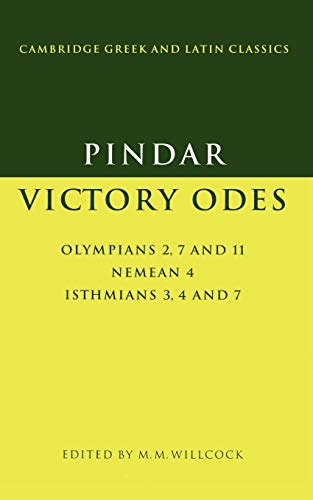Pindar
Victory Odes Olympians 2, 7 and 11; Nemean 4; Isthmians 3, 4 and 7 (Cambridge Greek and Latin Classics)
Pindar
BOOK REVIEW

In the realm of ancient Greek poetry, few figures shimmer with the intensity of Pindar. His Victory Odes are not merely commendations of athletic triumph; they are an intoxicating blend of divine inspiration, national pride, and human aspiration. As you delve into the intricacies of Pindar's work, particularly in his Odes dedicated to the Olympians, Nemeans, and Isthmians, you're swept into a world where glory is intertwined with the divine, and human endeavor is exalted to celestial heights.
Pindar, born in Thebes around 518 BC, is often hailed as one of the greatest ancient lyric poets. His poetry emerged against the backdrop of a Greece that was deeply immersed in athletic competition, mythology, and a burgeoning sense of civic identity. Within the rhythmic verse of Victory Odes, Pindar encapsulates the very essence of what it means to strive for excellence. His odes were composed to celebrate victors of the pan-Hellenic games, but they serve a much grander purpose: they are a call to transcend the ordinary, to grasp a bit of the divine in our fleeting human existence.
As you read through the carefully crafted lines of Olympians 2, 7, and 11; Nemean 4; and Isthmians 3, 4, and 7, you'll find not just mere praises but resonating themes of heroism, the fragility of life, and the interlacing of fate and free will. Each ode encapsulates the spirit of its respective athletic contest and its victor, weaving personal achievements into the larger tapestry of Greek culture. The powerful invocation of the Muse in these works is not just a poetic flourish; it is a reminder that every glory is inspired by something greater than ourselves.
Reaching deeper, you'll notice readers' voices echoing in the margins of this literary feast. While many praise Pindar's profound ability to intertwine the personal with the universal, others find fault in the complexity of his syntax. Some readers argue that the richness of his language sometimes veers into obscurity, leaving them longing for clarity amidst the grandeur. Yet, this very complexity is what allows Pindar's work to transcend time-it's a puzzle that invites multiple interpretations. Engage with it; let frustration mingle with fascination, as the imagery of gods and mortals unfolds before you like a vivid tapestry.
Moreover, the historical context of these Odes amplifies their significance. Composed during a period of intense national pride and cultural achievement, these lyrics not only celebrated individual athletic accomplishments but also underscored the values of arete (excellence) and philia (brotherhood) among the Greek city-states. With each victory recalled, Pindar challenges you to reflect on your own life's pursuits. Are you merely a spectator in the grand arena of existence, or are you striving for your own form of victory, however small?
By the end of your journey through Pindar's Victory Odes, you will not merely see athletic celebrations but a profound invitation to discover the extraordinary within the mundane. You may feel a surge of inspiration, as if Pindar himself is imploring you to join the ranks of the victors, urging you to harness the strength and determination found within these ancient verses.
This is not just a book; it is an experience-a portal to the heart of human ambition and the divine tapestry that weaves us together as mortal beings in search of eternal meaning. So let the words wash over you, and may you emerge not just a reader, but a victor in your own right, ready to conquer the next challenge that life hurls your way. 🌟
📖 Pindar: Victory Odes: Olympians 2, 7 and 11; Nemean 4; Isthmians 3, 4 and 7 (Cambridge Greek and Latin Classics)
✍ by Pindar
🧾 192 pages
1995
#pindar #victory #odes #olympians #nemean #isthmians #cambridge #greek #latin #classics #pindar #Pindar